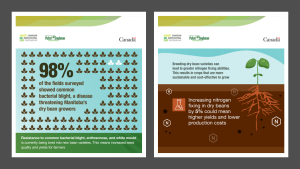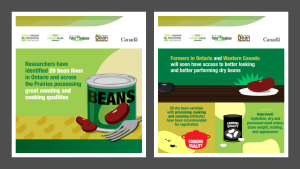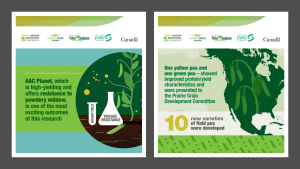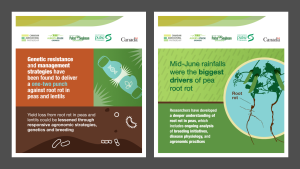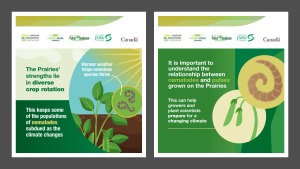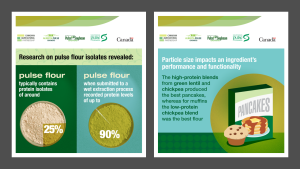From 2018-2023, Manitoba Pulse and Soybean Growers (MPSG) collaborated with government and industry partners under the Canadian Agricultural Partnership (CAP) Agriscience Cluster Program to invest more than $10 million into research projects through the recently completed Pulse Science Cluster.
Anyone can now access research results which help address some key priorities that were established through the cluster, aimed at improving the competitiveness of pulse crops in Canada. These priorities include enhancing field pea varieties through genetic improvements, mitigating root rots, gaining a better understanding of nematodes, and developing new strategies for utilizing faba beans and other pulse ingredients.
MPSG’s investment toward the projects under the five-year Pulse AgriScience Cluster program totaled $1,418,225. Through collaboration, the value of this research is over $17 million, with $11.1 million coming from the CAP AgriScience Cluster program.
“MPSG is pleased to have played a role in contributing to funding the Pulse Science Cluster,” said Melvin Rattai, MPSG Chair. “There is tremendous value to Canadian pulse farmers with the completion of this cluster and we look forward to seeing the positive outcomes and benefits this research will bring.”
Co-funding partners include Saskatchewan Pulse Growers, Alberta Pulse Growers, Ontario Bean Growers.
Investing in pulse science research and innovation is important for Canadian pulse growers to remain profitable and competitive. Coordinating research funding and programming maximizes efficiency, increases capacity, and improves the ability to adopt new innovative technologies.
View official news release here
Explore MPSG-Funded Projects
Developing Dry Beans for Disease Resistance and Improved Yield Performance in Western Canada
Dry bean growers in Western Canada will soon be rewarded. New varieties of dry bean with greater disease resistance, optimal seed quality, and higher yield will soon be ready to plant, thanks to a project led by Dr. Anfu Hou of Agriculture and Agri-Food Canada (AAFC) in Morden, Man.
READ MORE: Article Overview
Dry Bean Varieties with Improved Canning and Cooking Quality for Ontario and Western Canada
A research team in Lethbridge, Alta. is assessing the canning and cooking quality traits of experimental dry bean lines to ensure they meet the expectations of consumers and the canning industry.
READ MORE: Article Overview
Disease Management Strategies for White Mould and Bacterial Blights of Dry Bean
It is every pulse grower’s dream—a crystal ball that accurately predicts the risk of a disease outbreak during an upcoming growing season and recommends how to manage crops with the least amount of fungicide.
READ MORE: Article Overview
Development of Improved Field Pea Varieties, Germplasm for the Canadian Pulse Industry, and Evaluation of Flavour, Physicochemical and Functional Characteristics in High Protein Pea Breeding Lines
A field pea breeding program in Lacombe, Alta. is paying dividends for the Canadian pulse growers who help fund it.
READ MORE: Article Overview
Understanding Field Pea Breeding Initiatives, Physiology, and Agronomy to Mitigate Yield Loss by Root Rot
New research is shedding light on how genetic resistance and management strategies might work together to deliver an effective one-two punch in the fight against root rot in pea and lentil.
READ MORE: Article Overview
Vigilance Towards Nematodes in Western Canada
Fresh insights from studies into three nematode species aid in strengthening market security for Prairie growers who export their pulse crops to countries with strict quarantine rules.
READ MORE: Article Overview
Investigating Cholesterol Lowering Effects of Edible Bean
Researchers at the University of Guelph say there may be some truth to the old rhyme about “beans, beans, the magical fruit.” The results of a recent study demonstrate that eating 1 cup (250 mL) of canned beans a day can significantly decrease the risk of cardiovascular disease (CVD) in adults with elevated low-density lipoprotein (LDL) cholesterol, which is the “bad” kind of cholesterol that collects in your blood vessels.
READ MORE: Article Overview
Technical Analysis
New Processing Strategies for Canadian Grown Pulse Crops
A research project focused on the processing potential of pulses is creating marketable opportunities for Canadian farmers.
READ MORE: Article Overview
Explore Other Projects from the Pulse Science Cluster
Strategic Approaches for Faba Bean Value and Utilization

Utilization of Pulse-Based Ingredients to Develop Low-Glycemic Pet Foods to Improve the Health of Dogs
Removal of Undesirable Compounds and Flavour in Pulse Crops Using Electromagnetic Wave Technology

Dry Bean Resistance Screening and Variety Development
Breeding for Sustainable and Profitable Dry Bean Production


